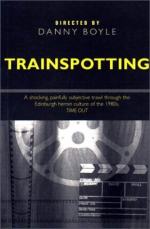|
This section contains 1,804 words (approx. 7 pages at 300 words per page) |

|
SOURCE: “High Society,” in Artforum, Vol. 34, No. 10, Summer, 1996, pp. 15–17.
In the following review, Reynolds contrasts the film version of Trainspotting with the novel, arguing that the film creates a different and less realistic portrayal of junkie culture.
In Britain, pop culture and drug culture are almost synonymous these days. From Oasis’ anthems of coked-out glory-lust to Pulp's number-one hit “Sorted for E's and Wizz” (a brilliantly ambivalent evocation of the dream and lie of rave), from the ganja-delic paranoia of Tricky to jungle's journeys into the dark side of Ecstasy culture, British pop is all highs and lows, uppers and downers. Other sectors of the culture industry lag behind music in reflecting what every British kid takes for granted: the sheer omnipresence and banality of recreational drug use. Which is why Irvine Welsh, chronicler of the “chemical generation,” has become such a cult figure, and why the movie...
|
This section contains 1,804 words (approx. 7 pages at 300 words per page) |

|


